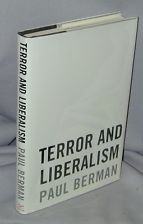Via Edward Fox, a quotation from Paul Berman’s (recommended) Terror and Liberalism:

“In the years around 1950, writers from several parts of the world set out to produce a new literature of political analysis, different from any political literature of the past, with the goal of describing and analyzing the totalitarian political passions of the twentieth century – the topic of the hour. There were a lot of these writers – Hannah Arendt, George Orwell, Albert Camus, Sidney Hook, C.L.R. James, Alego Carpentier, Czeslaw Milosz, David Rousset, Arthur Koestler, Arthur M. Schlesinger, Jr., Richard Wright and the other contributers to Richard Crossman’s anthology The God that Failed, and many others. The new literature came packaged in every shape – philosophical inquiry, science fiction, historical fiction, literary criticism, journalism, historical research, and autobiographical confession. The writers disagreed with one another. These people were not a faction. Still, their tracts and essays and novels did share one very noticeable quality. It was a tone of voice. And the tone expressed a shared emotion, which was this: astonishment.
“Every one of these writers had started out as an enemy of fascism and the extreme right in the 1930’s and ’40’s; and every one of them, glancing over his shoulder, had begun to notice after a while that communism in the age of Stalin was pretty scary too. And each of these writers made one additional observation, which was positively alarming. Fascism and communism were violent enemies of each other – bitter opposites. But, caught in a certain light, the bitter opposites looked oddly similar. And visible similarity led to an anxious worry. Was it possible that fascism and communism were somehow related? Mightn’t both of those movements have evolved out of some other, deeper, primordial inspiration? Mightn’t fascism and communism be tentacles of a single, larger monster from the deep – some new and horrible creature of modern civilization, which had never been seen and never been named but was, even so, capable of sending up further ghastly tentacles from the sinister depths?
“In Europe, and not just there, a new kind of politics did seem to be stirring, which sometimes called itself left-wing and sometimes right-wing – a demagogic politics, irrational, authoritarian, and insanely murderous, a politics of mass mobilization for unachievable ends.”
Related: Mussolini and Gentile’s philosophy of fascism, in the Philosophers, Explained series:
That’s a great excerpt!!!